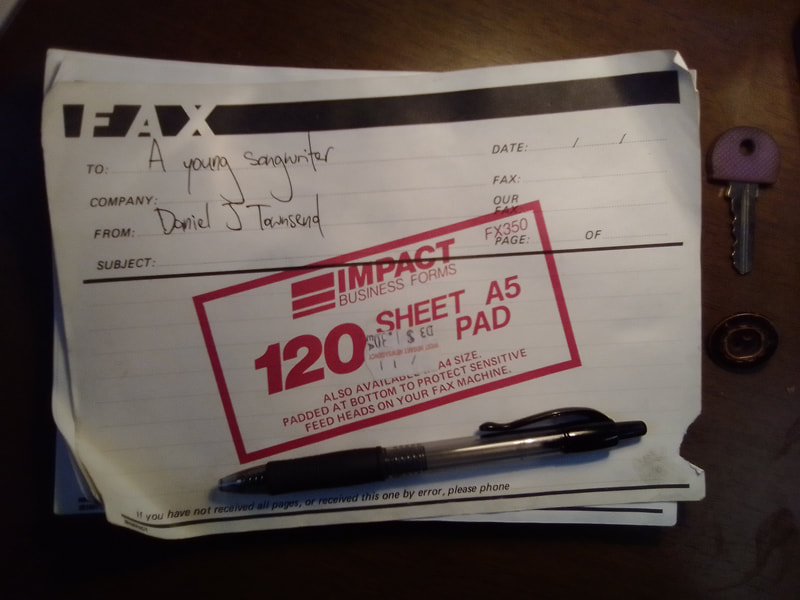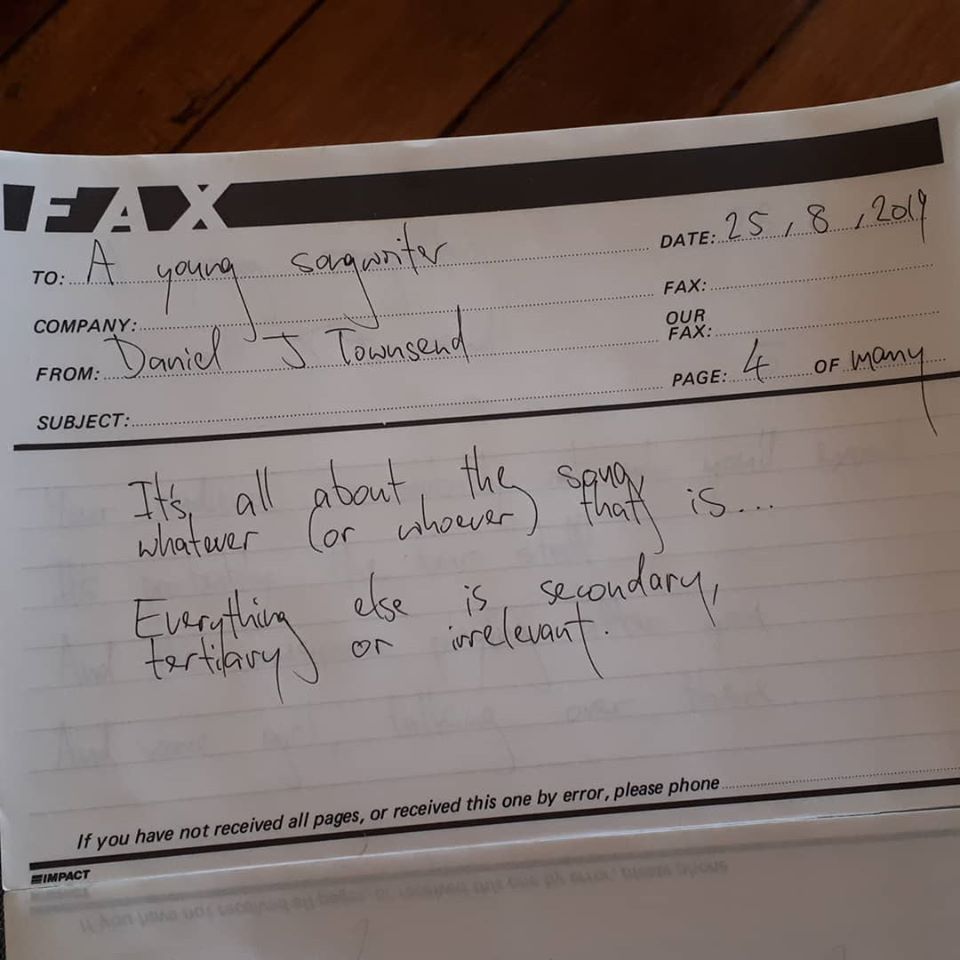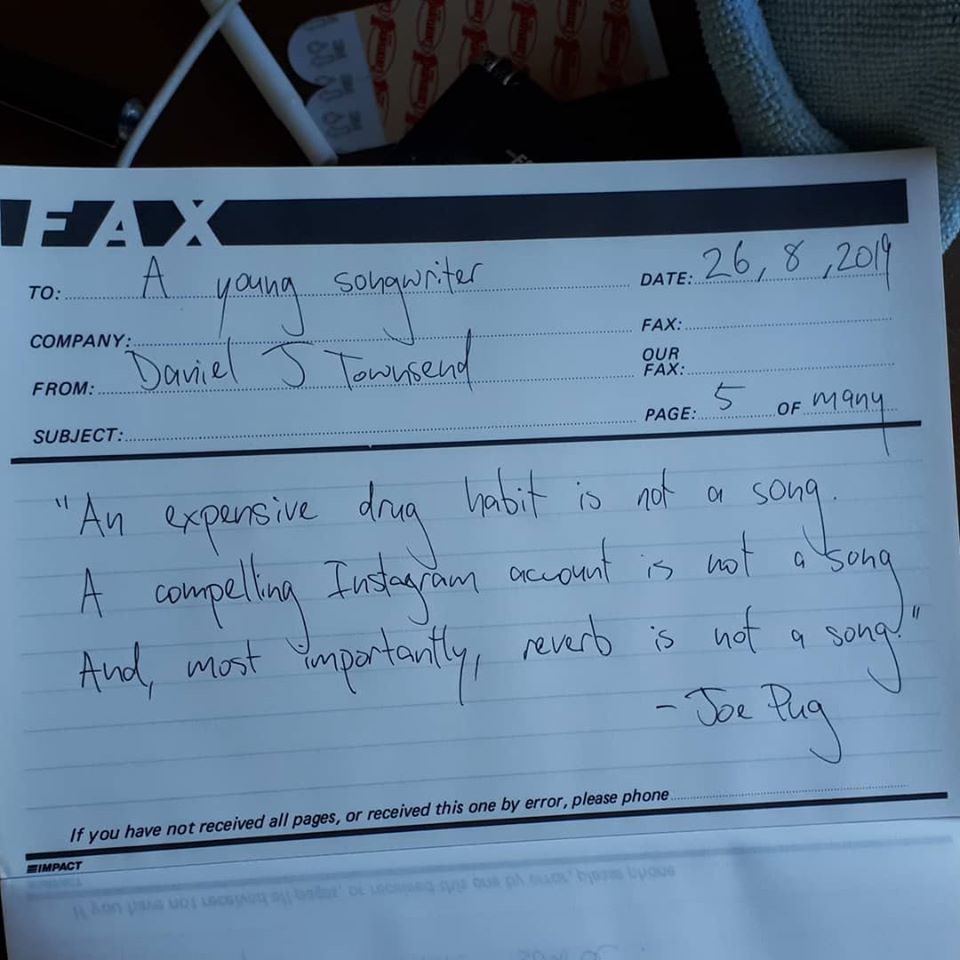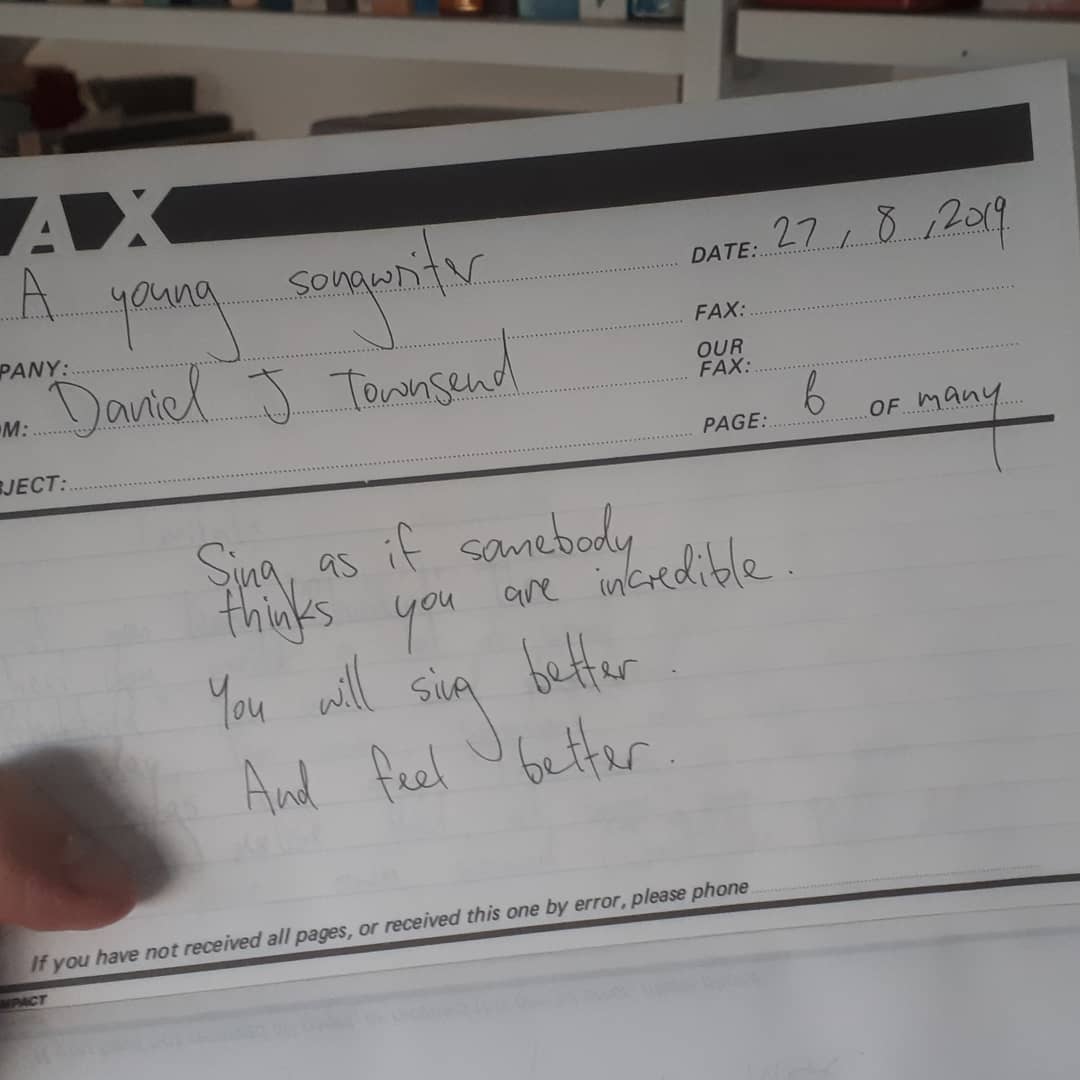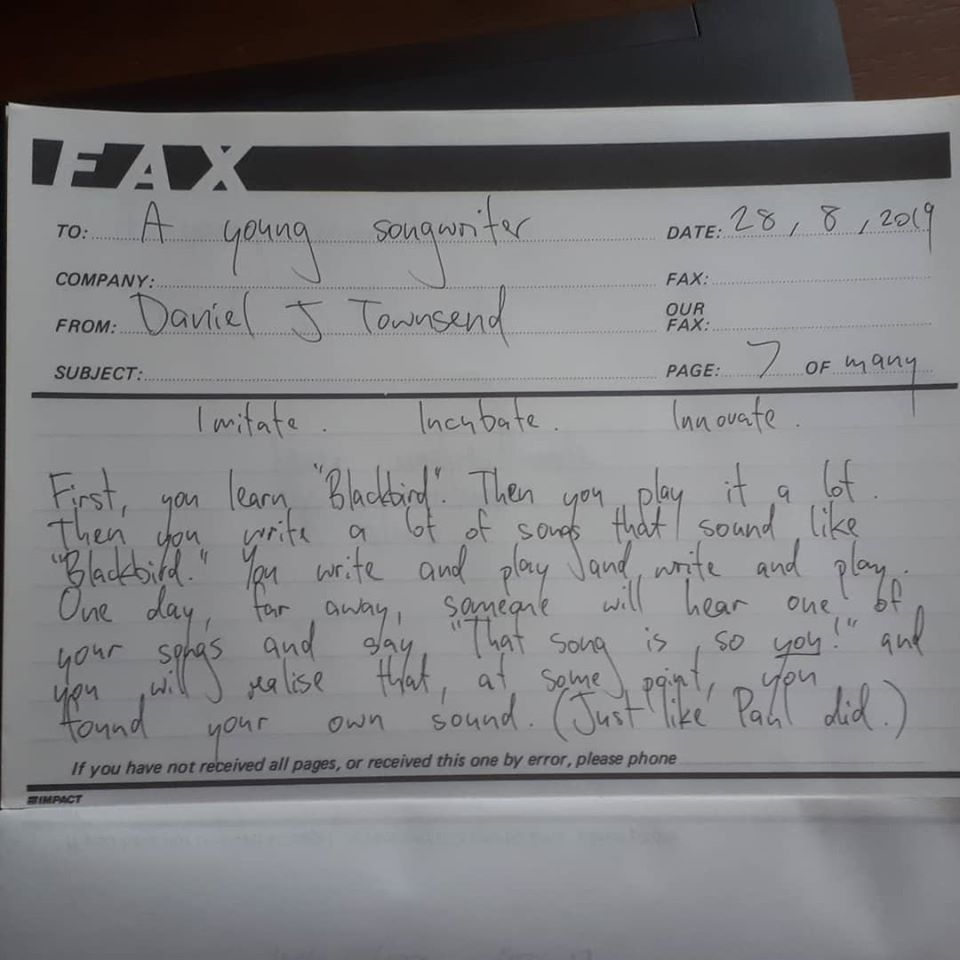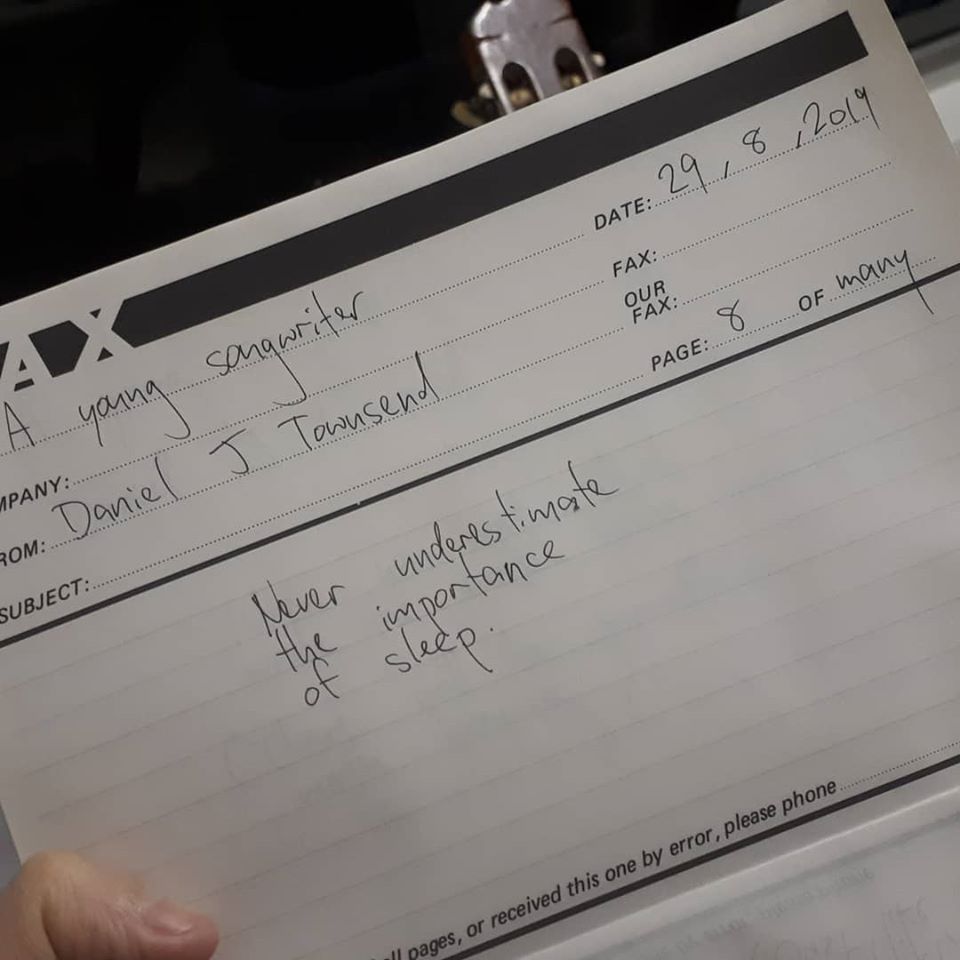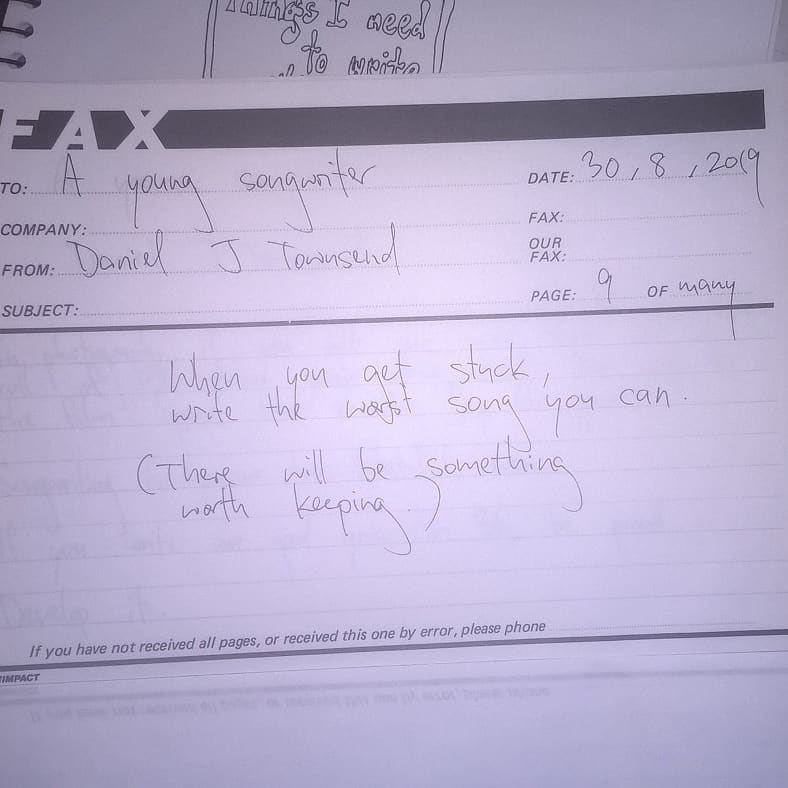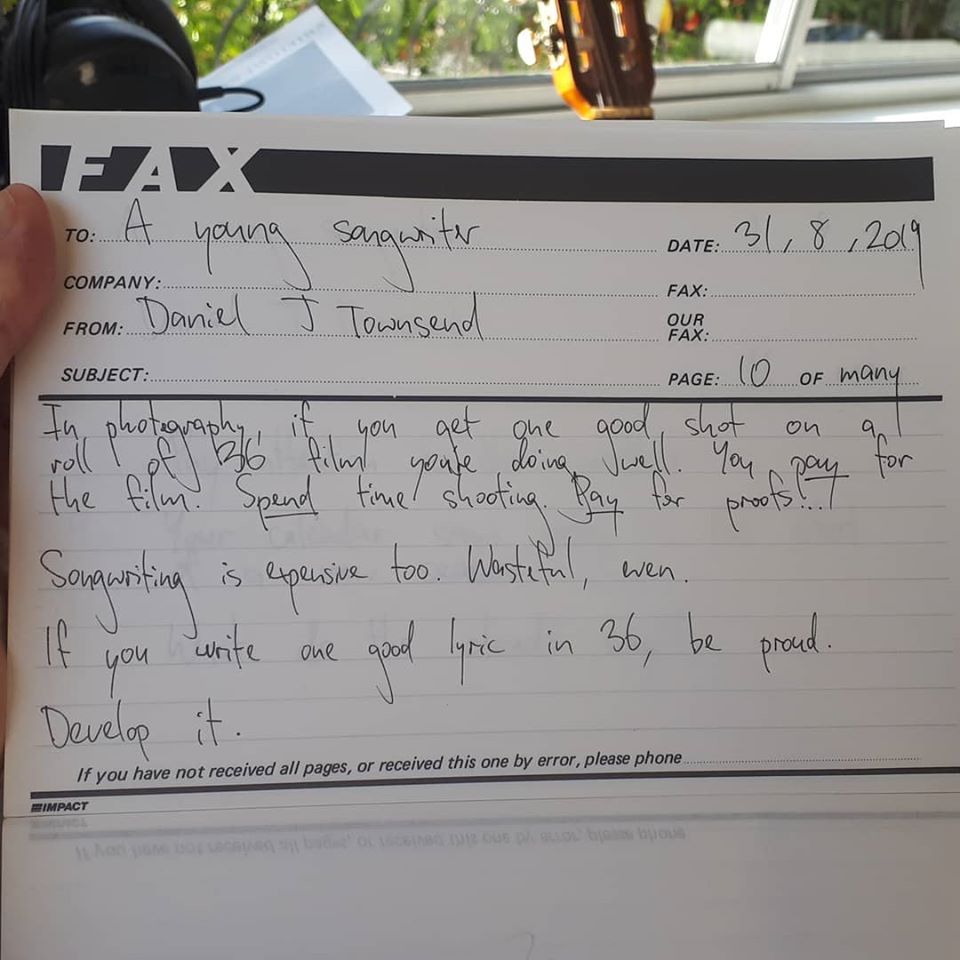I found this book of fax cover sheets in my local corner store. I didn't even know fax cover sheets were a thing. You probably know that Rainer Maria Rilke once wrote letters to a young poet. Well, I'm going to fax letters to a young songwriter; all the things I wish someone had told me when I was new. Simple.
I've started writing (faxing?) letters to a young songwriter. One a day. Maybe they'll write back?
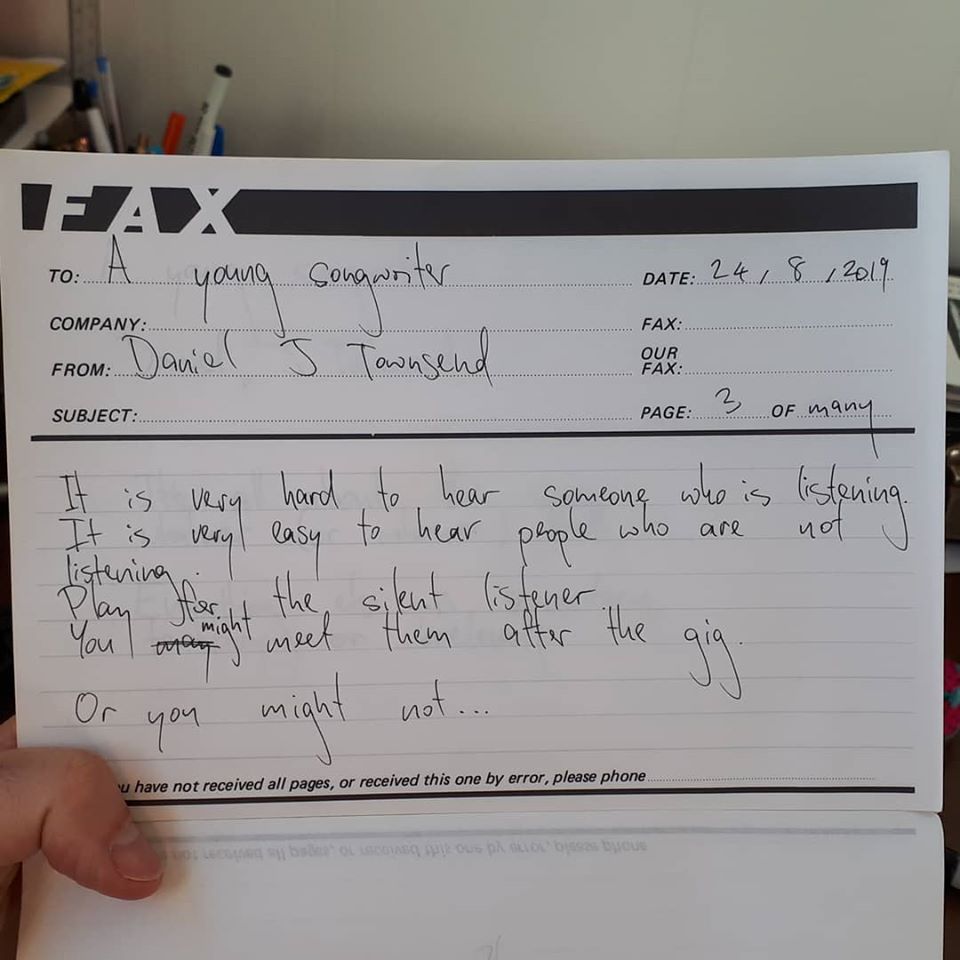
Back when I was brand new, performing in pubs on Wednesdays, I used to pride myself on engaging with hecklers. Giving back as good as I got, or just chatting with them like a normal human. Sometimes they just wanted to chat or share something from their own life, and I was happy to hear them out. Drunk Talk, mostly, but not always. Grief stories, without anywhere to go.
One night the pub was full but subdued. People were enjoying each other's company, absent-mindedly clapping at the end of each song. Naturally, I was chatting with the three vocal locals in the front row. I ended up playing one of their requests, an 80s pub rock singalong. The night plodded along and I didn't give it any more thought.
The next night I was onstage at my small town's other music venue. Partway through a song, some guy came up to the stage and interrupted me. Pretty sure he put his hand on my guitar. He said, "Sorry, mate, but I'm the owner of that pub you played last night. All the bar staff were really into your set until you started talking to those three guys up the front." And then he walked off.
That moment changed me.
One night the pub was full but subdued. People were enjoying each other's company, absent-mindedly clapping at the end of each song. Naturally, I was chatting with the three vocal locals in the front row. I ended up playing one of their requests, an 80s pub rock singalong. The night plodded along and I didn't give it any more thought.
The next night I was onstage at my small town's other music venue. Partway through a song, some guy came up to the stage and interrupted me. Pretty sure he put his hand on my guitar. He said, "Sorry, mate, but I'm the owner of that pub you played last night. All the bar staff were really into your set until you started talking to those three guys up the front." And then he walked off.
That moment changed me.
It's easy to get distracted from writing. You're probably distracting yourself right now. That's OK. Be kind to yourself. Now go write something. Write something else tomorrow.
Joe Pug is a great songwriter with a great podcast for folks like you and me. It's called The Working Songwriter and he chats with the kind of humans you'd expect, all of whom write songs. They all make their living from music, too, which is another fish-filled kettle, but for now it's enough to know that they all write songs. Some of his guests are insightful, some are simple, some are humble and some are kinda arrogant. In short, they're all humans. And they write songs. If you're not into it already, you oughtta check it out.
On another note, I've noticed I tend to binge-listen to podcasts. Then I suddenly feel all full up and start to resist the presenter ("Gargh, shut up stupid podcast man!") It's as if I've eaten way too much food. A sore tummy where my ears should be. I've never really thought of myself as a consumer until I found podcasts. I consume too much, too quick, and then I ache. The good news is, just as food gives me energy, consuming creative projects gives me energy to make stuff of my own.
Listen for a bit, then write for a bit.
Pretty sure that's how it's supposed to work.
On another note, I've noticed I tend to binge-listen to podcasts. Then I suddenly feel all full up and start to resist the presenter ("Gargh, shut up stupid podcast man!") It's as if I've eaten way too much food. A sore tummy where my ears should be. I've never really thought of myself as a consumer until I found podcasts. I consume too much, too quick, and then I ache. The good news is, just as food gives me energy, consuming creative projects gives me energy to make stuff of my own.
Listen for a bit, then write for a bit.
Pretty sure that's how it's supposed to work.
I remember one of my earliest solo shows. It was at The Royal Oak Hotel in Launceston. When I arrived, I walked with my guitar straight past the stage. Didn't even see it, it was so tiny. Milk crates covered in what had once probably been called carpet. This was back when you could still smoke in pubs. The place was crowded and noisy and hazy with cigarette exhaust.
Needless to say, I did my best to get down low and go, go, go. Tried to sing above the clanging indifference, the only stranger in a room full of friends.
When everyone else was talking between songs, there was one fella at the other end of the bar, nodding knowingly. Respectfully. Watched me with the eyes of a musician, the eyes of someone who'd been in my position in some distant history. Held his pint with one hand and clapped his knee with the other.
His name was Damien Greenwood and if he hadn't been there, looking and nodding, I would not be here. After my set, he got onstage and played like a man with nothing to lose. I watched and nodded, clapped my knee with my non-drinking hand. Within a few months, Damien was gone. Into the great silence. And here I am.
Needless to say, I did my best to get down low and go, go, go. Tried to sing above the clanging indifference, the only stranger in a room full of friends.
When everyone else was talking between songs, there was one fella at the other end of the bar, nodding knowingly. Respectfully. Watched me with the eyes of a musician, the eyes of someone who'd been in my position in some distant history. Held his pint with one hand and clapped his knee with the other.
His name was Damien Greenwood and if he hadn't been there, looking and nodding, I would not be here. After my set, he got onstage and played like a man with nothing to lose. I watched and nodded, clapped my knee with my non-drinking hand. Within a few months, Damien was gone. Into the great silence. And here I am.
Imitate:
Fifteen-year-old Daniel's music taste was very specific. He owned everything Nirvana had ever released and little else besides. He wrote songs for two years, before he debuted his best original, Return Of The Gnome Thing, for two musical friends. They responded with mutual silence, before cautiously noting that Daniel had used the chords from Bleach's Big Cheese and the strumming pattern from the b-side, Even In His Youth. Daniel had hoped they wouldn't notice.
As he reached his late teens, he got into solo male singer-songwriters. This was partly inspired by the hope he would not need a band, partly by the impression these artists gave him that one did not need to sing well to sing at all and partly by some profound conviction that he had something to say and this might be the format for speaking up. So, unfortunately for everybody, he wrote and played and sang a lot like Billy Bragg, but worse. Obviously.
He got into politics too. And religion. And Rage Against The Machine. In that order. "Who has the power / That be my question / The priest, the book or the congregation? / The mass or the few on this torn nation?" He got a degree, found the love of his life, joined an intentional community and lost his mind.
He became obsessed with harmony. Crosby, Stills and Nash, The Beatles, Simon and Garfunkel, Peter, Paul and Mary, The Weavers, Ladysmith Black Mambazo...
He discovered Australian folk-rock. Things of Stone and Wood, The Waifs, The Whitlams, Junior. He formed bands with acoustic guitars and 'Strayan-soundin' harmonies.
And all the time, he was writing songs.
After twelve years scratching away, one Wednesday afternoon he wrote a song called Hang Your Picture High and everything changed. This is where Daniel emerged from incubation into innovation. This is the moment Daniel found his voice, the first song that felt like a Daniel song. It's on YouTube, and it's still a special song for Daniel.
Fifteen-year-old Daniel's music taste was very specific. He owned everything Nirvana had ever released and little else besides. He wrote songs for two years, before he debuted his best original, Return Of The Gnome Thing, for two musical friends. They responded with mutual silence, before cautiously noting that Daniel had used the chords from Bleach's Big Cheese and the strumming pattern from the b-side, Even In His Youth. Daniel had hoped they wouldn't notice.
As he reached his late teens, he got into solo male singer-songwriters. This was partly inspired by the hope he would not need a band, partly by the impression these artists gave him that one did not need to sing well to sing at all and partly by some profound conviction that he had something to say and this might be the format for speaking up. So, unfortunately for everybody, he wrote and played and sang a lot like Billy Bragg, but worse. Obviously.
He got into politics too. And religion. And Rage Against The Machine. In that order. "Who has the power / That be my question / The priest, the book or the congregation? / The mass or the few on this torn nation?" He got a degree, found the love of his life, joined an intentional community and lost his mind.
He became obsessed with harmony. Crosby, Stills and Nash, The Beatles, Simon and Garfunkel, Peter, Paul and Mary, The Weavers, Ladysmith Black Mambazo...
He discovered Australian folk-rock. Things of Stone and Wood, The Waifs, The Whitlams, Junior. He formed bands with acoustic guitars and 'Strayan-soundin' harmonies.
And all the time, he was writing songs.
After twelve years scratching away, one Wednesday afternoon he wrote a song called Hang Your Picture High and everything changed. This is where Daniel emerged from incubation into innovation. This is the moment Daniel found his voice, the first song that felt like a Daniel song. It's on YouTube, and it's still a special song for Daniel.
No magic here, cobber. It's just the way things are. Play your set, then seek out a good night's rest as soon as you can. If you're lucky, you'll dream, wake, and write from your subconscious.
And if you're waking up tired, a word to the wise:
Many years ago a doctor told me that we have a kind of bucket of good energy in the brain. (His words not mine.) When we sleep the brain is supposed to fill up the bucket. We should wake up refreshed, ready to do stuff, feeling good when we should, enough petrol in the tank to drive up disappointing hills so we can coast down the other side later. All that.
I was waking up tired, not enjoying the good stuff and crying in the shower for reasons unknown. He asked me if this had been going on for more than three weeks. Turns out it had been going on for fourteen years.
So I got medicated, saw a therapist, wrote a hundred songs about it... All the good things.
If you're waking up tired, there's a hole in your bucket. So fix it, dear Henry.
And if you're waking up tired, a word to the wise:
Many years ago a doctor told me that we have a kind of bucket of good energy in the brain. (His words not mine.) When we sleep the brain is supposed to fill up the bucket. We should wake up refreshed, ready to do stuff, feeling good when we should, enough petrol in the tank to drive up disappointing hills so we can coast down the other side later. All that.
I was waking up tired, not enjoying the good stuff and crying in the shower for reasons unknown. He asked me if this had been going on for more than three weeks. Turns out it had been going on for fourteen years.
So I got medicated, saw a therapist, wrote a hundred songs about it... All the good things.
If you're waking up tired, there's a hole in your bucket. So fix it, dear Henry.
A brilliant glass artist, Keith Dougall, once challenged me to create something ugly. The catch was that it couldn't be contextually ugly, just physically unappealing in and of itself. It was impossible. Even fresh dog shit glistens in the morning sun, dusted with frost like tiny diamonds.
So, go write an ugly song. And let me know how you go!
So, go write an ugly song. And let me know how you go!
Working, waiting, working, waiting...
Working:
In The Artist's Way, author Julia Cameron argues that every creative needs to write three pages every day. She calls them Morning Pages, and says we all need them to get the rubbish out of our heads so the creative stuff can come out of our hearts. It feels like work. Because it is. Oftentimes I'll get a lyric or two, or an idea, but sometimes I don't.
Waiting:
When we lived in the Northern Territory our house was on bore water. You'd turn on the tap and the water would be reddy-brown, coloured by dirt. It would be hot too, because the pipes were exposed to the brutal Top End sun. Eventually the water would run clear and cool, a life source from some deep, dark place.
Working:
In The Artist's Way, author Julia Cameron argues that every creative needs to write three pages every day. She calls them Morning Pages, and says we all need them to get the rubbish out of our heads so the creative stuff can come out of our hearts. It feels like work. Because it is. Oftentimes I'll get a lyric or two, or an idea, but sometimes I don't.
Waiting:
When we lived in the Northern Territory our house was on bore water. You'd turn on the tap and the water would be reddy-brown, coloured by dirt. It would be hot too, because the pipes were exposed to the brutal Top End sun. Eventually the water would run clear and cool, a life source from some deep, dark place.
